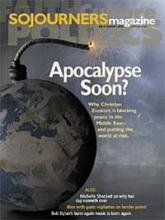Let's face it—we live in a country where filmmaker Michael Moore's anti-war outburst at the Oscars got more public attention than did several million Europeans (and a million or so of us) marching in the streets for the same cause.
It's sad, but true. American political dialogue has about as much depth as one of those new flat-screen TVs and as much variety as your choice of computer operating systems. We're entertained to death and intellectually starved. So often the only way to get an alternative viewpoint heard is to put it in the mouth of an entertainer.
This situation has been a long time coming. Film stars have used their notoriety to bring attention to progressive causes since the 1930s. There was a break in the tradition during the blacklist of the 1940s-50s Red Scare. But beginning in the late 1960s, Hollywood celebrities became staples of the anti-war and civil rights movements. Warren Beatty funded and advised the McGovern campaign. Jane Fonda went to Hanoi. Marlon Brando hung out with AIM and the Black Panthers. When the Democratic Party went into hibernation during the Reagan era, Hollywood voices and dollars became even more important to peace and justice movements.
Historically, this happened because film represents the ultimate alliance of art, big business, and cultural power. Art requires artists, with their messily independent spirits. And the power to make the myths of American culture (from Gone With the Wind to Easy Rider) is inevitably political. Add to all that the fact that many people in politics (electoral and otherwise) are frustrated performers drawn to the spotlight, and you've got the makings of a political hothouse.
Read the Full Article
